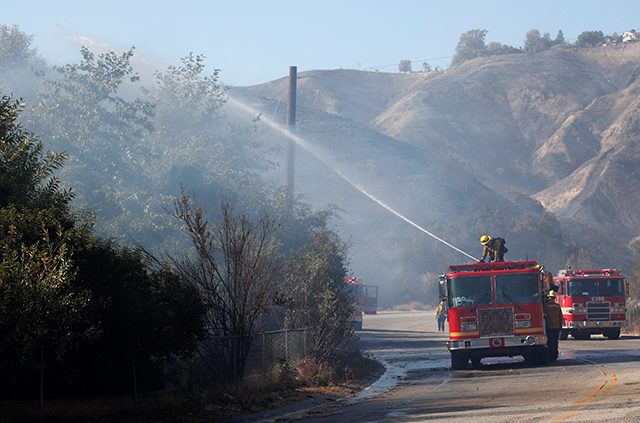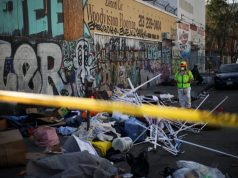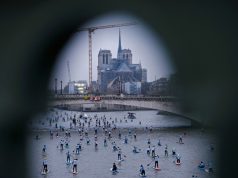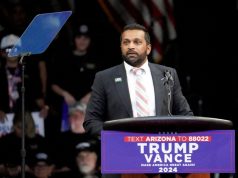
PARADISE, California — Two deadly wildfires fueled by “devil winds” tore through opposite ends of California on Sunday, with residents urged to heed evacuation orders by officials forced to leave their own homes.
In northern California, the Camp Fire is one of the deadliest and most destructive in the state’s history, killing at least 23 since it broke out on Thursday northeast of Sacramento and consumed much of the mountain town of Paradise. More than 100 were reported missing.
Hundreds of miles to the south, at least two people died in the Woolsey conflagration threatening the wealthy beach community of Malibu, near Los Angeles.
Looting was reported in the southern fire area and arrests were made, police reported.
Hot dry winds expected to blow until Tuesday whipped up the flames and heightened the urgency of evacuation orders, officials said.
“We are entering a new normal. The rate of spread is exponentially more than it used to be,” said Ventura County Fire Chief Mark Lorenzen, noting at a press conference that California‘s fires in 2018 grow far more quickly than they did even 10 years ago.
Several officials urged residents to heed evacuation orders, noting they themselves had followed orders to leave their homes for safety.
“Winds are already blowing. They are going to blow for the next three days. Your house can be rebuilt but you can’t bring your life back,” said Chief Daryl Osby of the Los Angeles County Fire Department.
Crews pushed forward to achieve 25 percent containment of the Camp Fire in northern California, which had burned 109,000 acres at the edge of the Plumas National Forest, according to Cal Fire’s website. In Southern California, where the Woolsey Fire scorched 83,275 acres, the blaze was only 10 percent contained.
The Camp Fire burned down more than 6,700 homes and businesses in Paradise, more structures than any other California wildfire on record, and the death toll, which could rise, also makes it one of the deadliest.
Only the Griffith Park Fire in 1933 and Tunnel Fire in 1991 have claimed more lives.
Several of the bodies discovered earlier this week were found in or near burned out cars, police have said. The flames descended on Paradise so fast that many people were forced to abandon their vehicles and run for their lives down the only road through the mountain town.
More than 110 people were reported missing in the fire-scorched area.
Winds of up to 40 miles per hour (64 km per hour) were forecast to blow in the north and gusts of up to 70 mph (113 kph), the so-called Santa Ana “devil wind,” were expected in Southern California.
The Woolsey Fire doubled in size from Friday night into Sunday threatening thousands of homes after triggering mandatory evacuation orders for a quarter million people in the upscale beach city as well as other communities in Los Angeles and Ventura counties.
Governor Jerry Brown asked U.S. President Donald Trump to declare a major disaster to bolster the emergency response and help residents recover.
“We’re putting everything we’ve got into the fight against these fires and this request ensures communities on the front lines get additional federal aid,” Brown’s letter said.
Trump, on a trip to France, said in a Twitter post early Sunday, “With proper Forest Management, we can stop the devastation constantly going on in California. Get Smart!”
The Republican president has previously blamed California officials for fires and threatened to withhold funding, saying the state should do more to remove rotten trees and other debris that fuel blazes.
State officials have blamed climate change and said many of the burn areas have been in federally managed lands.—Reporting by Stephen Lam in Paradise; Additional reporting by Alex Dobuzinskis, Dan Whitcomb and Dana Feldman in Los Angeles, Rich McKay in Atlanta, Barbara Goldberg in New York, and David Shepardson in Washington; Editing by Alexandra Hudson, Lisa Shumaker and Andrea Ricci









